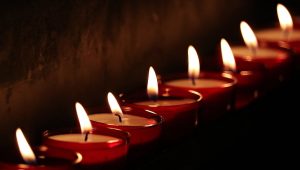by Steve Kriss, Executive Minister
“Blessed are those who mourn …
Blessed are those who hunger and thirst after justice.”
—Jesus, Sermon on the Mount
“We will remember not the words of our enemies, but the silence of our friends.”
—Rev. Dr. Martin Luther King
I was horrified watching the video of the arrest and killing of George Floyd from Minneapolis last week.
 I mourn the loss of Mr. Floyd’s life. I lament that his death is part of the 400-year legacy of violence against Black people and African Americans in the United States. I cannot simply look away from the history or the current reality. I extend my sympathies to the family and community that knew and loved him.
I mourn the loss of Mr. Floyd’s life. I lament that his death is part of the 400-year legacy of violence against Black people and African Americans in the United States. I cannot simply look away from the history or the current reality. I extend my sympathies to the family and community that knew and loved him.
Over the last week, I have reflected on the story of when Jesus turned over the tables at the temple. Jesus was also angry about injustices that denied the image of God imprinted on all people. I want to seek justice and move toward holy anger like Jesus. In today’s context, this means moving toward understanding the anger of others who carry the fear and consequences of generations of white supremacy and racial injustice. This means moving toward seeking racial justice that allows the full flourishing of all people and all places as God intends.
I acknowledge the pain, frustration and fear of my friends, family, colleagues, and neighbors who are Black and African American. My silence betrays my friendships, my commitments, and my understanding of God’s call in my own life and within my role as Executive Minister in our Conference. Silence becomes complicity in systemic violence against Black and Brown people. As a white male Christian, I want to continue to find ways to name and dismantle white supremacy in all the ways that it manifests both personally and corporately. I have to do my own work of addressing power, privilege, and responsibility. This means learning to share power, to openly share resources, and to actively resist narratives that seek to dehumanize or devalue the lives of Black and Brown people.
I feel particularly raw these days as my own city of Philadelphia has erupted in protest and disruption. I am currently writing while we are under curfew. I hear and feel the weighty concern and frustration of colleagues.
I am committed to our work together of intercultural transformation and racial justice. Part of that work means sharing the struggle of Black and African American members, neighbors, colleagues, family, and friends. This means bearing witness to anger, fear, and frustration. Mutual transformation can be long and uncomfortable work but it can also be hopeful and joy-filled. This means to be changed in relationships and through what I am learning about us as a mosaic of people with different backgrounds and experiences—Black, Brown, White, Asian, Latinx and even more specifically as African, Indonesian, Slavic, Colombian, Vietnamese, Mexican, Germanic, Indian, Jamaican, Haitian, and Chinese.
I am committed to continuing to lead us in ongoing repentance, mutual transformation, and dismantling the framework of white supremacy. I am committed to acting in ways that exhibit and proclaim that Black lives matter. We cannot embrace silent complicity while embracing our new Mosaic Conference identity. God is calling us into something new that means leaving some things behind, including our history as the Quiet in the Land.
One of our legacies as Mennonites in Philadelphia was to be part of the first public protest from white folks against slavery in this hemisphere. I want to lead in ways that help us recover the well of spiritual depth that empowered our Mennonite forebearers to speak out against injustice and inhumanity. Those of us who are white Mennonites have lost some of that spiritual fire and capacity in our relative comfort. Jesus did not hesitate to speak truth and to bear witness to both religious and civil authorities. Neither can we.
In our newness as Mosaic Conference, in the midst of social upheaval, in the midst of a pandemic, I still believe that the Spirit is upon us with power to be witnesses. These days, that witness includes underscoring the value of Black lives. It means crying not only for peace but also for justice. It means mourning together and seeking justice together knowing that Jesus promises we will both be comforted and satisfied.
The work lies ahead of us, within us, all around us. And I know for sure that God is in it with us.
The opinions expressed in articles posted on Mosaic’s website are those of the author and may not reflect the official policy of Mosaic Conference. Mosaic is a large conference, crossing ethnicities, geographies, generations, theologies, and politics. Each person can only speak for themselves; no one can represent “the conference.” May God give us the grace to hear what the Spirit is speaking to us through people with whom we disagree and the humility and courage to love one another even when those disagreements can’t be bridged.
This post is also available in: Español (Spanish) Indonesia (Indonesian)
This post is also available in: Español (Spanish) Indonesia (Indonesian)
